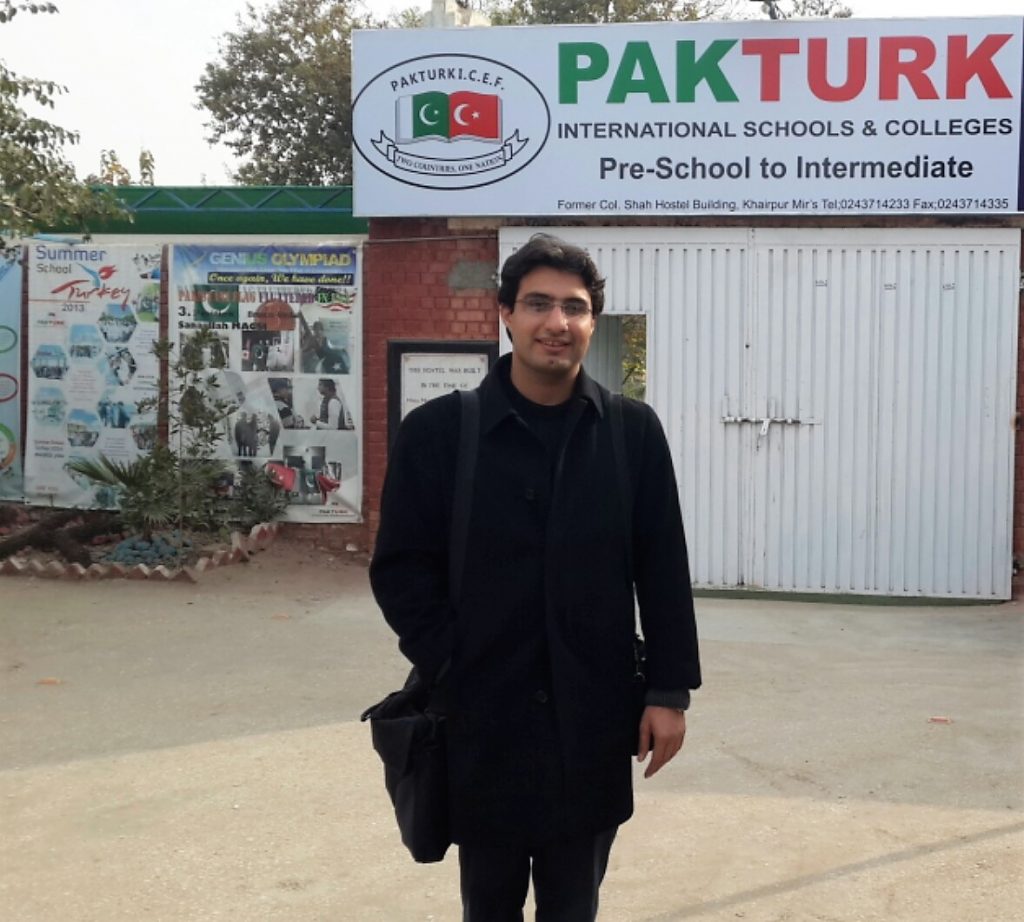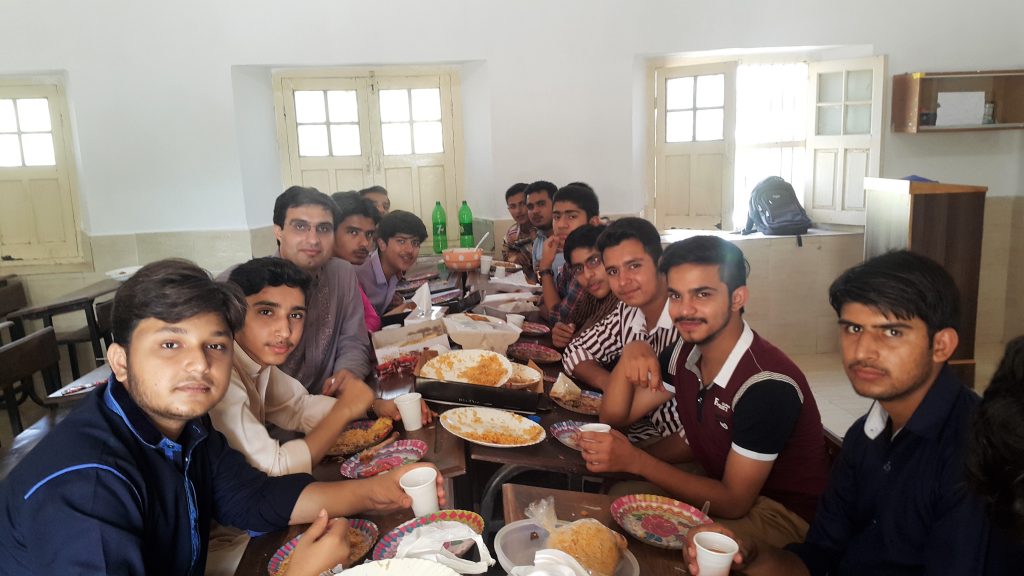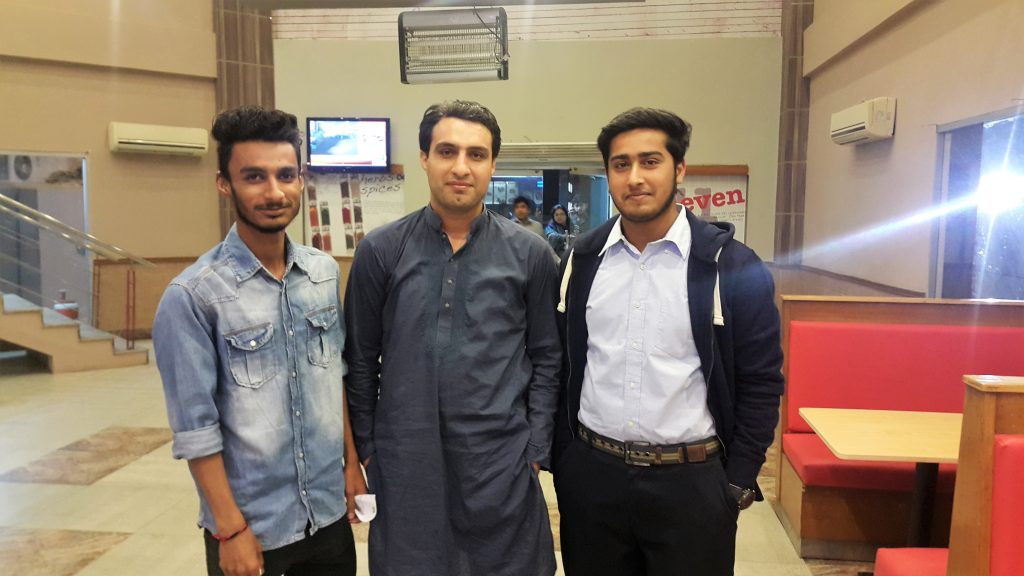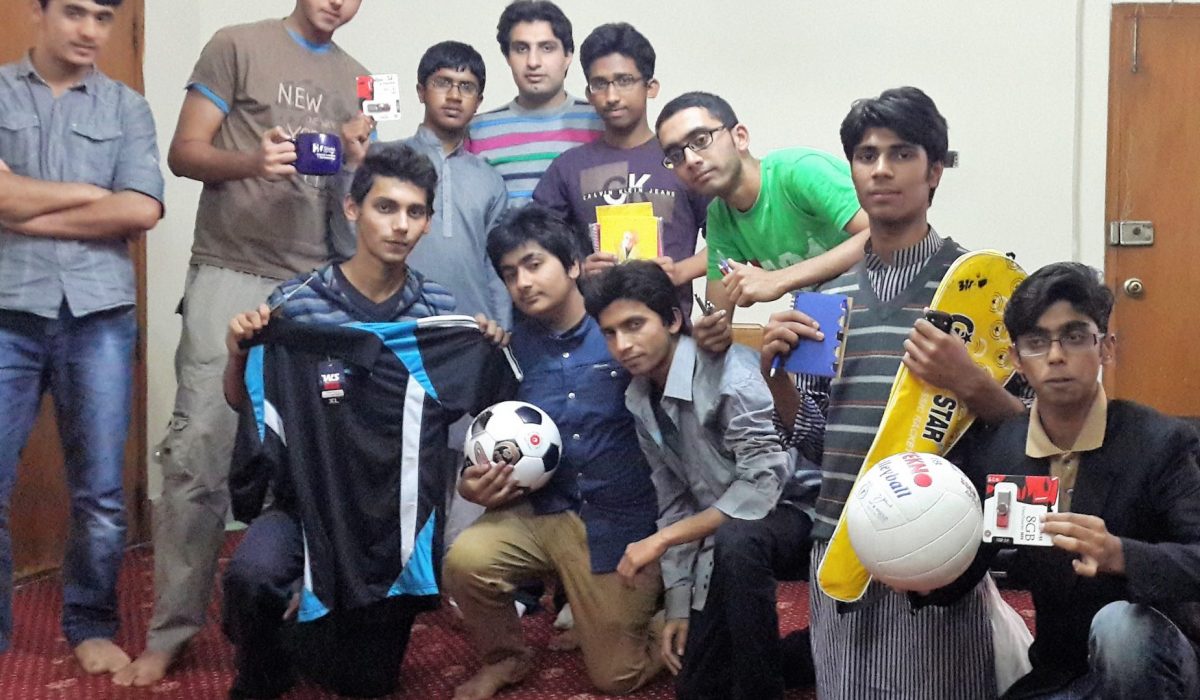Chemistry teacher Hakan Tokdemir (1): The good conduct of our students won praises from people

Ramadan blessings on the roads of Balochistan
August 30, 2021
A full-fledged annual night in Lahore
September 1, 2021Hakan Tokdemir’s emigration story began when he migrated to Istanbul from Siirt at 5 with his family. Years after this journey forced by life conditions, he stepped for another migration, to Pakistan, this time willing it with all his heart. He was a young and idealistic teacher who believed generations raised with love would establish world peace, and his first students waited for him in Quetta, a city surrounded by mountains in one of Pakistan’s most rugged regions.
We talked to Hakan Tokdemir, a Chemistry teacher who also worked in Multan and Khairpur Mirs, about Pakistan where he lived for 8 years and leaving there. Continuing his profession in an African country, Tokdemir says he is still in touch with his first students now at university age and that he is very glad they have not forgotten him.
Can you tell us about your life before you went to Pakistan?
I was born in 1986 in Siirt. I migrated to Istanbul with my family when I was 5 years old. We are a large family; I have 10 siblings. Due to various problems, my father had to migrate. I attended primary school in Gaziosmanpaşa, Istanbul. My father’s economic situation was not good, he could educate only three of his children. Others had to work. They kind of took care of us all. I am fortunate in that respect. I graduated from high school in 2003. In 2005, I qualified to be placed in the Department of Chemistry at Samsun 19 Mayıs University. I graduated in 2009. After studying English for 1.5 years in Ankara, I moved to Pakistan on March 16, 2011 to teach there.
You went abroad when you could live in your own country and to carry out your profession in more comfortable conditions. What motivated you?
My biggest dream was to teach in the Turkish schools abroad. As an education volunteer, I wanted to help the children there, serve and spread exquisite values. I always had this thought. Although I come from a difficult family, Allah granted me, and I went abroad.
Were your family’s expectations different? How did they receive your decision?
I had been tested my family on this issue. My family was politically left-leaning, and they were against such things. When I graduated from the university, I wanted to go to the United States at first. I studied English for that. My father liked the idea, so he did not hinder at first. It didn’t work and I couldn’t get an American visa. However, I did not give up on my goal abroad. I researched where I could go either as visa-free or with easier visa procedures. I didn’t want to tell my family until my destination was final and I bought a plane ticket. While I was planning to go to the United States, a friend said, “You will go to Pakistan!” Allah knows, that was going through my heart too.
In 2010, a devastating flood disaster had struck Pakistan. In those days, I collected financial aid from my own circle and handed it over to the Kimse Yok Mu Aid and Solidarity Association to be sent to the people of Pakistan. These always had been synchronicity. I knew my family wouldn’t approve of me going to Pakistan. They did everything they could to keep me from leaving. “Why are you going to a poor country? Stay here, help us with our work; if you wish, we can start a business for you,” they said. We argued a lot, but I could not convince them. Allah knew my intention. Even though I was offended, I did not give up and went to Pakistan.
After staying there for a year, I came to Turkey on vacation. My family’s attitude had not changed, they were even more mercurial. My father sat me down in front of him and said, “If you go, I will not forgive my rights on you! Even if I die, do not come to my grave!” I said, “I’m not doing something bad. I am a teacher. I’m going there for Allah’s sake. You might be right if I did something bad, but I’m not disrespecting you, I’m going to take care of my students. What could be wrong with that?” Once again, I broke up with my family, them and I offended.

I WAS HAPPY TO GO TO PAKISTAN WHILE MY FAMILY OBJECTED
What did you know about Pakistan before you went there?
I had little idea on my mind, but I knew it wasn’t an easy place to live. I heard about the bomb explosions on the news every day. People would die in such attacks every day. I had a love of service in my heart, and I also had my students. “No matter what happens, I will go and teach my students there. I will take care of them, I will tell them about peace, serenity and love.” I was saying to myself. I focused on these, so I didn’t go with prejudice.
What were your first impressions of Pakistan?
I first landed in the capital, Islamabad. I can’t forget that day. First, it was very hot and I was very tired. My feelings were mixed. Allah had granted me the opportunity and I emigrated. Meanwhile, I had also left my family behind. I had a concoction of feelings. I was happy that I hit the road somehow. I can’t forget my first night. One azaan after another was chanted past midnight. I thought it was probably for the tahajjud prayer. A brother called and said, “Here you can see a running horse besides a walking or standing horse. We wish you to serve.” I had arrived with that intention. It was there I learned I was posted to Quetta as my place of duty. The capital of Balochistan province which borders Iran and Afghanistan, Quetta is a city surrounded by mountains. First, I started there as a General Science teacher. A year later, I started teaching Chemistry.
Islamabad was a beautiful city with green environment and neat buildings. When I went to Quetta, I said to myself, “Islamabad really was a city!” Because Quetta was a very difficult place especially in 2011-12 when daily explosions claimed the lives of 10-15. However, the love and respect of the students and the interest and trust of the locals always had a positive effect on us. These helped us to focus on our own work. Quetta is one of the coldest places in Pakistan. In winter, the temperature drops below zero. It is a flat geography surrounded by mountains. Like the climate, people seemed too cold at first.
How was your rapport with the students? What activities did you do with them?
My first students were in 6th grade. They were young in age and I loved them very much. We would not sit and chat for hours, but we loved one another very much. We played soccer and shared jokes. Besides the classes, we spent time in the school garden or in the dormitory, sometimes reading books or having conversations. I even went camping with them for 4 days to another city 2-3 hours away from Quetta. Maybe now I wouldn’t dare take responsibility for schoolchildren that young. It meant taking 10 students from a difficult city in Pakistan to another city for an academic and recreational camp. It was somewhere between the mountains. We would play cricket and perform our prayers in congregation. There were cherry trees in the garden of the place where we stayed. I would talk to my students, “These are not ours. We cannot touch them. We are not allowed to reach or take something to which we do not have the right.” When we were leaving, the landlord came and expressed his astonishment. “How long have these children been here? They haven’t touched a tree or damaged anything. We are very pleased with you!” he said. They were also very surprised at how meticulous our students were.

‘SIR, DO PEOPLE EVER FORGET THEIR PARENTS?’
I tried to help children in all their needs. Sometimes I tutored them for subject revision. Sometimes we played cricket. Perhaps because they were young, they loved their teachers who took care of them in this way. I still have contact with my early students. They’re attending universities now. The last time I spoke to someone, I asked him, “Have you forgotten me?” He replied, “Sir, does anyone ever forget his parents? You are like my family.” I was very surprised and glad to hear that. The love and dedication of our students was worth everything.
During our last reading retreat, some brothers from abroad visited us. They asked the students about the books they read. One student said he had read the life of Hacı Kemal Erimez and another said he had read the life of the Holy Prophet (peace and blessings be upon him). Later, the schoolchildren sang Turkish hymns. Brothers liked it. They couldn’t hold back their tears.
You mentioned Quetta bore risks in terms of security. Do you have any memories of that?
The city would be sealed often closed due to bombings. Public institutions, markets and other public places would immediately close and everyone would rush home. One student had hurt his finger on one day. We had to go out to visit a hospital. We barely found a doctor and got the boy’s hand treated. Another day, an explosion claimed the lives of over 10 people. Roads and hospitals were closed. One student at school had fallen and injured his head. He had also lost consciousness. When the students informed us, we immediately placed him a car and drove to the hospital. There were soldiers and police officers on the roads. Everywhere was closed, but we had to take a child, who was entrusted to our care, to the hospital. We approached the hospital and saw a crowd of people. They had blocked the road and were protesting something. We had to get out of the car and carry the child to the hospital in our arms. On the one hand, I prayed so nothing happened to the child, on the one hand, I tried to clear the way by shouting in English. When people saw the injured boy, they cleared the way. We entered the hospital and the boy was given the first aid.
How was your rapport with the students’ families?
All friends talk about the warmth and sincerity of the parents in Pakistan. We liked the manner they received us into their homes, opened their doors, loved us as much as their own children, and treated us with full sincerity. These captured everyone’s heart. I still keep in touch with some of parents. During our final period in trouble, we received their support the most, financially and morally. Since I spoke English, I had no difficulty in communicating. Quetta is also a complex place in terms of language. Brohi, Urdu, Pashto, and Balochi languages were spoken. Whenever a group of students came together, they would speak in their mother tongue.
Did you have trouble adjusting to living conditions? What things caused difficulty or ease for you?
During my first year, I could hardly eat anything properly. My stomach is a little reactive to spicy food. Pakistanis have very famous dishes like ‘biryani’, but even that made my stomach hurt. I didn’t complain, though. I tried to manage. I tried to find spice-free food. I tried to get used to it that way.
I had no trouble adapting to social life. There are boxy three-wheeled motorcycle taxis called “rickshaws”. Normally, they are for 3 passengers, but with my students, we used to ride as 5-6 people. I used to give the kids goals like “If you do well in the exercises, I will take you to a pizzeria” or “If you get into the top four positions, we will go there”. You can’t even imagine the places we went to eat, in terms of hygiene etc. We loved it all and we were happy. The vendors would serve chips very different from what you know. We would also eat chicken gyro called ‘shawarma’. We were very happy. We would never complain. The students were also very diligent. Whatever they liked doing, I tried to do with them. I learned to play cricket. We played soccer. The students followed Turkish football teams closely. All were fans of Turkish teams just like us.

WE’D EVEN INCLUDE THE COOK IN SOCCER MATCHES
There was a Beşiktaş match once. Some students had removed the black-and-white banners of a political party and waved it as a team flag to support Beşiktaş. They were fans to the core. It was as if the cultures of Turkey and Pakistan had amalgamated.
In which city did you work after Quetta?
I lived and worked in Quetta for 1.5 years. Besides my teaching duties, I also worked as the dormitory manager. Later, I was posted to our school in Multan, a city in the Punjab province and one of the hottest places in the world. I stayed in a flat with some university students there. The temperature would sometimes shoot up to 50-55 degrees. The electricity would remain cut for 10 hours. In our flat, we had a room cooler with evaporative water fan. It cooled the air with steam. We used to place it in the living room so the visiting students could sleep comfortably. I lived in that condition for a year. Yet, like the weather in Multan, the people there were very friendly, very kind, and respectable.
Our school building was not large. The schoolyard was not large either, but I did my best to take care of my students. I used to take the students in groups with my own car to the places we would go for social activities. We had few students. When we couldn’t find enough players for a soccer match, we used to include our cook in one team. Multan was a warm place, but we were happy with our students and we were trying our best. I stayed there for about a year. I had very good days, and I had memories I will never forget.
I left a meeting at 11 o’clock one night. I have a student with me, we were going home in my car. While I was driving through the side streets, my student pointed at something outside. He exclaimed, “Sir, the boy has fallen!” Right in front of me, a boy fell off the bike he had been riding. There was no one around. We got out of the car and went to him. He fell on his head and his face was distorted. He had trouble breathing and his eyes were closed. He was unconscious. We placed the boy in the back seat of my car. I sat my student next to him. I said, “Put your hand in his mouth so that his tongue does not block the windpipe.” I sped to reach the hospital fast. Meanwhile, I called a brother to explain the situation, “Did you hit him?” he asked me first. That was the first thing that came to mind.
The first two hospitals we went did not admit the boy. On the one hand, I was afraid that the boy would breathe his last in our custody; you should have seen how I drove the car on the streets, with that fear and worry. Meanwhile, my student continued attending the injured boy in the backseat. We went to the state hospital and barely carried the boy inside. Doctors arrived and checked. The boy could not remember his parents because he had hit his head. After a while, he remembered his family’s phone number. We called and they arrived. They did not even ask who had brought their child to the hospital in such a hurry and how it had happened. We also left the hospital. Unfortunately, he was a young boy, a grade 8 student. Children at this age were riding motorcycles there.
Your attendance at that late hour proved to be a blessing for the boy, but wasn’t that also a risk for you?
Not everyone takes someone in their car at that hour of night. The first thing that comes to mind is the question, “Is it you who hit him?” Even my own colleague asked me that. I never thought of that, though. I just endeavoured to save the boy. A week later, a phone call came from the boy’s parents. “We’re sorry we couldn’t thank you at the hospital. May Allah bless you,” they said. I told them I wished to come over and say “get well soon” to the boy. I went to their house to visit. The condition of the child was distressing. I asked him, “Do you remember me?” but he could remember nothing.
To be continued…
***
Part Two: Chemistry teacher Hakan Tokdemir (2): What made Pakistan beautiful for us was the people





No Comment.